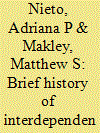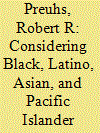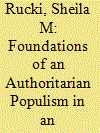|
|
|
Sort Order |
|
|
|
Items / Page
|
|
|
|
|
|
|
| Srl | Item |
| 1 |
ID:
184477


|
|
|
|
|
| Summary/Abstract |
Over 40 million people in the U.S. Southwest depend on water from the Colorado River. Seven States, Arizona, California, Colorado, Nevada, New Mexico, Utah, and Wyoming, have rights to the river. For millions of years, it has carved its way from high in the western Rocky Mountains south and west, skirting the borders of California, Nevada, and Arizona before giving its water to a delta in Mexico. It rarely makes it to the Gulf of California, its original terminus. The Colorado Plateau encompasses over 150,000 square miles. The plateau includes geologic wonders like the Grand Canyon, Black Canyon of the Gunnison River, Canyon de Chelly on the Navajo Reservation, Canyonlands, Arches, and Rainbow Bridge, among others. The authors recommend that we turn to the past and include the perspectives of diverse communities, who have ties to the region and its waters going back centuries to avoid a water shortage in the future.
|
|
|
|
|
|
|
|
|
|
|
|
|
|
|
|
| 2 |
ID:
184473


|
|
|
|
|
| Summary/Abstract |
Most of the literature on racial or ethnic groups’ foreign policy preferences focuses on parochial or diasporic interests to demonstrate group-specific influence in this policy realm. This situation leaves room for addressing the impact of African American, Latino and Asian American, and Pacific Islander (AAPI) racial/ethnic identities on individual-level preferences for broader, non-parochial, foreign policy issues and the degree to which multiracial preference coalitions (or agreement) emerge in a fashion reflective of domestic policy attitudes. Utilizing data on a range of contemporary foreign policy issues from the 2018 and 2019 Congressional Cooperative Election Studies (CCES), the analyses reveal that minority preference coalitions emerge across a wide range of foreign policy issues, a pattern that is most dramatic among Latino and Black Democrats. Moreover, these coalitions suggest minority moderation relative to white co-partisans from both parties.
|
|
|
|
|
|
|
|
|
|
|
|
|
|
|
|
| 3 |
ID:
184474


|
|
|
|
|
| Summary/Abstract |
Religious identities based on both religious tradition and religious commitment have been increasingly influential in domestic U.S. politics for several decades, but the assumption remains that such identities are mostly unrelated to foreign policy. The authors suggest that domestic political incentives to expand the culture wars have combined with other trends, including the increasing use of unilateral executive power in foreign policy, to create an environment in which policymakers increasingly are tempted to make foreign policy based on domestic political incentives. Three case studies are highlighted: the “Mexico City” policy requiring foreign non-governmental organizations (NGOs) receiving U.S. aid money to pledge not to provide or educate about abortion, moving the U.S. embassy in Israel from Tel Aviv to Jerusalem, and efforts in the Trump administration to ban travel to the United States from majority-Muslim nations.
|
|
|
|
|
|
|
|
|
|
|
|
|
|
|
|
| 4 |
ID:
184479


|
|
|
|
|
| Summary/Abstract |
A recurring question posed in recent issues of Orbis has been whether we find ourselves in a new era of great power competition. If so, are there lessons to be learned from America’s Cold War experience? Editor Nikolas K. Gvosdev asked John F. Lehman— former Secretary of the Navy, member of FPRI’s Board of Directors, and one of America’s leading strategic thinkers and policymakers—for his advice for U.S. strategists in this new era of great power competition, based on his experiences during the Cold War. Readers of Orbis will also benefit from Secretary Lehman’s assessments with the release of his new book, Where are the Carriers? U.S. National Strategy and the Choices Ahead.
|
|
|
|
|
|
|
|
|
|
|
|
|
|
|
|
| 5 |
ID:
184472


|
|
|
|
|
| Summary/Abstract |
The rise of populism, and its subsequent challenge to liberal democratic institutions, is an ongoing feature of twenty-first century global politics. The author contends that providing college students with theoretical tools to untangle the relationship between the logic and practices of domestic populist political movements and liberal democratic institutions empowers them to analyze critically those challenges and consider the extent to which populism is indicative of prior institutional failure. The work of Antonio Gramsci and Ernesto Laclau are used to develop a model of populism appropriate for advanced undergraduate international relations students. The cases of the Tea Party, Donald Trump’s 2016 presidential campaign, Victor Orbán’s rise in Hungary demonstrate the dynamics of the model and its relevance to the study of international relations and foreign policy.
|
|
|
|
|
|
|
|
|
|
|
|
|
|
|
|
| 6 |
ID:
184475


|
|
|
|
|
| Summary/Abstract |
This article focuses on Metropolitan State University Denver Debate’s participation in the 2020 Schuman Challenge, a competition hosted by the Delegation of the European Union to the United States. Undergraduate participants were asked to answer the question: “How should the EU and the U.S. respond to China’s alternative models of governance?” In response, the debate team focused on the People’s Republic of China’s human rights violations against the Uyghurs. Three recommendations to address this injustice were presented: (1) expand the use of the Magnitsky Act; (2) amplify current EU/U.S. sanctions; and (3) apply pressure on China’s efforts to secure natural resources. Overall, the debate team’s research suggested that these approaches would both strengthen the EU/U.S. partnership and promote a coordinated response to China aimed at pursuing justice for the Uyghur people. This article also highlights the authors’ journey to engage in advanced undergraduate research focused on foreign policy.
|
|
|
|
|
|
|
|
|
|
|
|
|
|
|
|
| 7 |
ID:
184478


|
|
|
|
|
| Summary/Abstract |
Sustainable development directly aligns with local, regional, national, and global security. In the last decade, much progress has taken place in graduate sustainability education and research. However, undergraduate sustainability education programs have not shown the same levels of achievement. Metropolitan State University of Denver (MSU Denver) is one of the pioneer universities to have established its Sustainable Systems Engineering Program at the undergraduate level. Since 2016, the Program has been revised and improved upon. This article details the relationship between undergraduate sustainability education and national security, and explores the undergraduate sustainability education practices at MSU Denver as a model. The authors emphasize the development of program educational objectives (PEO), curriculum design, and assessment. The recently developed course, “Leadership in Sustainable Design,” is discussed, illustrating the university’s introduction of general sustainability concepts to interdisciplinary undergraduate students.
|
|
|
|
|
|
|
|
|
|
|
|
|
|
|
|
| 8 |
ID:
184476


|
|
|
|
|
| Summary/Abstract |
This article aims to demonstrate how eco-artists in Latin America are paving a new way for us to engage with water, the environment, and extractive industries. It contends that professors and teachers can enrich their curriculum by encouraging students to engage the work of eco-artists. Moreover, educators should design assignments across disciplines that require students to get out and engage with the resources they are trying to study. This effort requires new ways of thinking about teaching, learning, and water. What is at stake? In a very real sense, the future of human life on earth—perhaps pressingly security. Without clean, accessible drinking water, chaos ensues, which can risk the stability of entire regions.
|
|
|
|
|
|
|
|
|
|
|
|
|
|
|
|
|
|
|
|
|